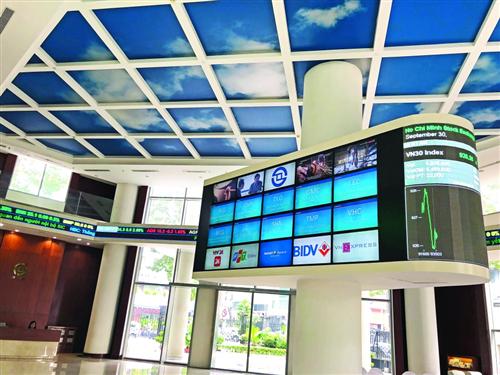Public companies fined for late share trading
Public companies fined for late share trading
Six companies have been fined VND300-350 million (US$12,920-15,070) each for not trading shares on the stock market after becoming public.The total fines for the six companies is VND1.79 billion. According to the State Securities Commission (SSC), the action aims to push equitised firms to put shares on the stock market after they become public.
SSC on January 20 issued a fine worth VND350 million to Quang Ninh Port JSC. The company has not yet listed shares on the stock market.
There are now three platforms for equitised companies to trade shares on, which are the Ho Chi Minh Stock Exchange (HoSE), the Ha Noi Stock Exchange (HNX) and the Unlisted Public Company Market (UPCoM).
Among the three markets, rules are stricter on HoSE and HNX – the two main bourses – and often loosened on UPCoM.
Post-privatisation State-owned enterprises (SOEs) have been widely expected to at least trade shares on UPCoM so the shares are liquidable and shareholders can trade based on market-driven principles.
Current regulations require a company to trade shares on UPCoM within 30 days after the SSC approves it has become public or after the firm completes its IPO.
Companies are also encouraged to skip UPCoM and trade shares on the other two stock markets if they are confident about business operation and information transparency.
Other companies that have been penalised for not trading shares are Ha Noi Concrete Construction JSC, cement producer Cong Thanh Group and construction material maker Trung Do JSC.
Meanwhile, others such as the HCM City-based tourism business Vietravel was fined for starting to trade shares too late after the day it became public.
Vietravel had not submitted listing files to the market regulators for more than 12 months after it became public.
The company submitted its profile to the Ha Noi Stock Exchange on June 4, 2019, then made its UPCoM debut on September 27, 2019 with more than 12.6 million shares.
According to Quang Ninh Port JSC’s general director Dinh Anh Tuan, the board does not fully understand the rules about putting shares on the stock market.
The company only focuses on its business activities while it is hard for the firm to be fully aware of the regulations. Tuan expects the market regulators will provide additional assistance for the company and it will trade shares when the market conditions are met.
According to the SSC, unlisted and untraded companies often claim losses and unsettled post-equitisation stage are the major obstacles for trading and listing shares.
To resolve the problems, the SSC and the Ministry of Finance have proposed the Prime Minister ask ministries and sectors to take a look at all SOEs to see why they have failed to list shares on the stock market.
The finance ministry also proposes the Prime Minister give disciplinary measures for company boards who manage the State capital in the firm if they intentionally delay trading shares.
























